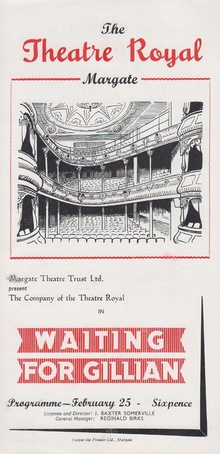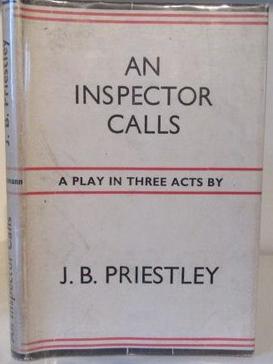
An Inspector Calls is a play written by English dramatist J. B. Priestley, first performed in the Soviet Union in 1945 and at the New Theatre in London the following year. It is one of Priestley's best-known works for the stage and is considered to be one of the classics of mid-20th century English theatre. The play's success and reputation were boosted by a successful revival by English director Stephen Daldry for the National Theatre in 1992 and a tour of the UK in 2011–2012.

Alastair George Bell Sim, CBE was a Scottish character actor who began his theatrical career at the age of thirty and quickly became established as a popular West End performer, remaining so until his death in 1976. Starting in 1935, he also appeared in more than fifty British films, including an iconic adaptation of Charles Dickens’ novella A Christmas Carol, released in 1951 as Scrooge in Great Britain and as A Christmas Carol in the United States. Though an accomplished dramatic actor, he is often remembered for his comically sinister performances.
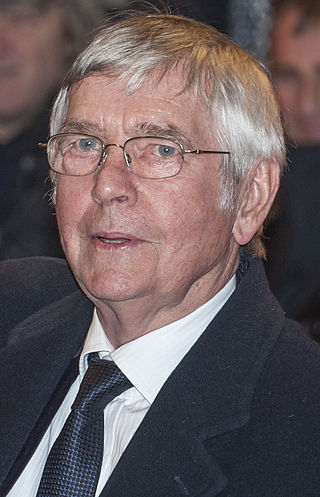
Sir Thomas Daniel Courtenay is an English actor. After studying at the Royal Academy of Dramatic Art, Courtenay achieved prominence in the 1960s with a series of acclaimed film roles, including The Loneliness of the Long Distance Runner (1962), for which he received the BAFTA Award for Most Promising Newcomer to Leading Film Roles, and Doctor Zhivago (1965), for which he received an Academy Award nomination for Best Supporting Actor. Other notable film roles during this period include Billy Liar (1963), King and Country (1964), for which he was awarded the Volpi Cup for Best Actor at the Venice Film Festival, King Rat (1965), and The Night of the Generals (1967). More recently, he received critical acclaim for his performance in Andrew Haigh's film 45 Years (2015).
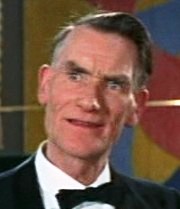
John Duncan Macrae was one of the leading Scottish actors of his generation. He worked mainly as a stage actor and also made five television appearances and seventeen films.

John Paton Laurie was a Scottish actor. In the course of his career, Laurie performed on the stage and in films as well as television. He is perhaps best remembered for his role in the sitcom Dad's Army (1968-1977) as Private Frazer, a member of the Home Guard.

John Michael Terence Wellesley Denison (1 November 1915 – 22 July 1998 was an English actor. He often appeared with his wife, Dulcie Gray, with whom he featured in several films and more than 100 West End theatre productions.

Benjamin Arthur Flemyng, known professionally as Robert Flemyng, was a British actor. The son of a doctor, and originally intended for a medical career, Flemyng learned his stagecraft in provincial repertory theatre. In 1935 he appeared in a leading role in the West End, and the following year had his first major success, in Terence Rattigan's comedy French Without Tears. Between then and the Second World War he appeared in London and New York in a succession of comedies.
Robert Kemp (1908–1967) was a Scottish playwright. Along with Tom Fleming and Lennox Milne, he was a founder of the Edinburgh Gateway Company.
Thomas Kelman Fleming, FRSAMD was a Scottish actor, director, and poet, and a television and radio commentator for the BBC.
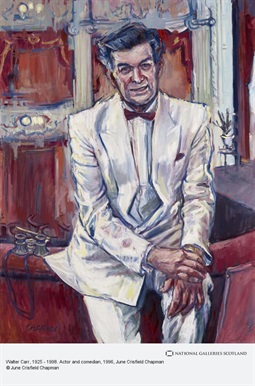
Walter Carr was a Scottish actor and comedian.
The Westminster Theatre was a theatre in London, on Palace Street in Westminster.

Theatre in Scotland refers to the history of the performing arts in Scotland, or those written, acted and produced by Scots. Scottish theatre generally falls into the Western theatre tradition, although many performances and plays have investigated other cultural areas. The main influences are from North America, England, Ireland and from Continental Europe. Scotland's theatrical arts were generally linked to the broader traditions of Scottish and English-language literature and to British and Irish theatre, American literature and theatrical artists. As a result of mass migration, both to and from Scotland, in the modern period, Scottish literature has been introduced to a global audience, and has also created an increasingly multicultural Scottish theatre.
Drama at Inish is a comic play by the Irish writer Lennox Robinson which was first performed at the Abbey Theatre, Dublin on 6 February 1933. The storyline of the play serves as a parody of the plots and atmosphere of the plays being performed within it.
The 1947 Edinburgh Festival Fringe was the first edition of what would become the world's largest arts festival, the Edinburgh Festival Fringe.
The Gateway Theatre was a Category C listed building in Edinburgh, Scotland, situated on Elm Row at the top of Leith Walk.
The 1948 Edinburgh Festival Fringe was the second edition of what would become the world's largest arts festival, the Edinburgh Festival Fringe. It was in this year the word "Fringe" is commonly accepted as having first been associated with the event, after it was used by an Edinburgh Evening News critic. The term would come to define the event, and spawn the genre of fringe theatre. It was, however, still several years before it became common parlance in connection with the event or theatre in general, and also some time before any formal organisation of the event took place.

Samuel Johnson was an actor-manager and Shakespearean actor of the 19th century and a member of Henry Irving's Company at the Lyceum Theatre, for which he played the comedic roles.
The Burning Glass is a 1954 dramatic play by Charles Morgan.
Victor Carin was a Scottish actor, director, and translator, who wrote for radio, television, film, and the stage.
Drama remained an important part of the Edinburgh International Festival during its second decade. Almost all performances took place at the Royal Lyceum Theatre, The Assembly Hall, and the former Gateway Theatre.
